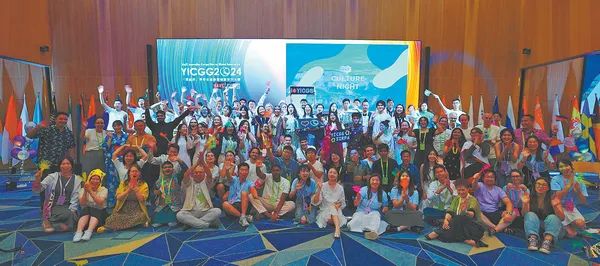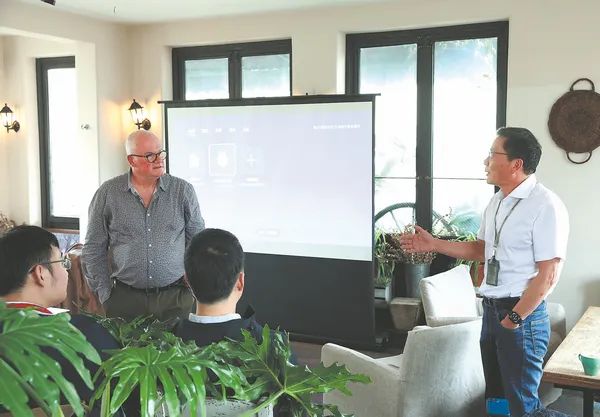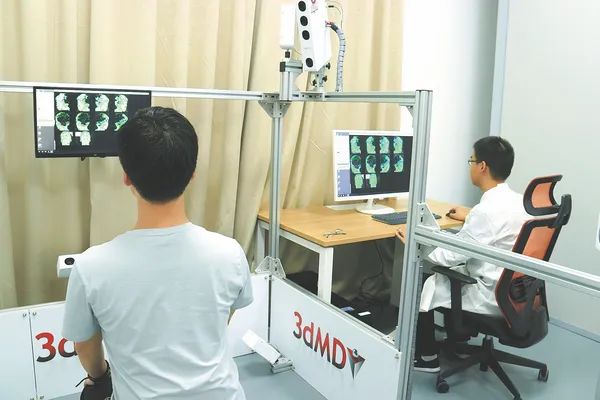Institution's reach has progressed in leaps and bounds, making it a leader in some fields, Zhou Wenting reports in Shanghai.

More than 100 participants and guests from over 30 countries gather at the Rong Chang Cup Youth Innovation Competition on Global Governance, in Budapest, Hungary, in July. Fudan University was one of the organizers. CHINA DAILY
Started in Shanghai in 2018, the International Human Phenome Consortium has expanded to involve 23 institutions and teams based in 20 countries, including 14 academician-led teams, according to Shanghai-based Fudan University.
This is an indication that the International Human Phenome Project, a major initiative led by Chinese scientists to provide new insight into the analysis of health and disease, has been recognized by a growing number of scientists from around the world.
A phenome is the set of all traits expressed by an organism, cell, tissue or organ. If twins are separated and one grows up in a low-altitude region, while the other grows up in a high-altitude place, they will have totally different phenotypes — not only in appearance, but also in terms of proteins, metabolism and organ function. This is the result of the influence of environmental factors on the phenotype, influences that are closely related to health, disease and longevity.
"At its establishment, the project attracted the participation of 18 top scientists from 14 countries as founding board members, marking the first steps of the international scientific community in this international big science initiative," says Tian Mei, secretary of the IHPC.
"This has also established China's leading capacity and voice in the field," says Tian, who is also the executive president of the university's Human Phenome Institute.

Craig Anderson (left), a clinical neuroscientist, joins Fudan University's Institute of Science and Technology for Brain-inspired Intelligence. CHINA DAILY
International Cooperation
Fudan's research strength in the field of human phenomes is the epitome of the prestigious school's role in international academic and research cooperation today. From participant and follower, Fudan, which is one of the country's top institutions of higher education, has grown in power across disciplines, to become a leader in the area of joint studies.
It also demonstrates that the university's sustained efforts to open up and enhanced capacity for global collaboration have reaped results, according to scholars.
The International Human Phenome Project, which was launched by scholars including Jin Li, president of Fudan University, is expected to play an important role in promoting the development of precision medicine, improving the accuracy of diagnosis, promoting the research and development of new drugs, and in analyzing the history of human evolution.
The second phase of the project was launched in November 2023. Ten academicians and some 400 scholars and experts from China and abroad attended the launch event.
A Human Phenome Atlas showing the associations between more than 1.5 million phenotypes, most of which had been newly discovered by scientists, was compiled during the first phase of the project between 2018 and 2022. It provides key clues to deciphering the causality and mechanisms between phenotypes and life phenomena, such as disease and aging.
In the second phase, a more complete map will be compiled, and scientists will conduct substantive, collaborative research in order to answer key queries around the phenotype and its regulatory mechanism, which is at the core of the mystery of life and health.
"We really need an Asian country to lead in life science instead of counting on Western countries, as human diversity is huge, and the data collected in research programs should not be limited to Western people only," says Hoh Boon Peng, a professor at the International Medical University Malaysia.
Another example of Fudan's strength in leading international research is establishment of the first international center of excellence, or ICoE, on the Chinese mainland by Integrated Research on Disaster Risk, a global research program created by the International Science Council and the United Nations Office for Disaster Risk Reduction.

Doctors from the hospitals affiliated with Fudan University, who are participating in medical assistance in Morocco, perform an operation in a hospital.
Founded in 2020, the Fudan University ICoE is dedicated to interdisciplinary research on the risk interconnectivity of climate change, the atmospheric environment, and health, and is closely focused on academic exchange and scientific research collaboration with overseas universities and research institutes.
Universities and institutes from Germany, the United States, France, and countries involved in the Belt and Road Initiative, such as Indonesia, as well as international organizations, have joined the international cooperation network set up by the Fudan ICoE for interdisciplinary collaborative research.
The ICoE team participated in the compilation of the World Health Organization 2021 Global Air Quality Guidelines and co-hosted a symposium on air quality and health in the same year. The event was attended by the World Meteorological Organization, the WHO, and the United Nations Environment Programme, and their respective agencies. The heads of Asian regional offices participated in the discussions on the implementation of the new WHO guidelines in Asia.
"We're building a world-class platform," says Tang Xu, executive director of the center.
When talking about the secret to leading a series of high-level international research collaborations, Feng Jianfeng, dean of Fudan's Institute of Science and Technology for Brain-inspired Intelligence, says that they take the initiative to communicate with overseas counterparts through a variety of channels.
"The departments of science, engineering and medicine of the university are taking scientific research as the focus to promote open cooperation, and train world-class scientists for the future," says Feng.
"During the past five years, the proportion of published papers involving international cooperation from our institute has risen as high as 79 percent in a single year. In 2022, the number of such papers reached 122," he says.
In the medical field, hospitals affiliated with Fudan University have also been responsible for a number of world firsts. These include the world's first gene therapy for hereditary deafness, the first stem cell transplant treatment for the IRF4 gene defect, a rare disease, and the annual treatment volume at one of the hospitals providing proton and heavy ion treatment is first in the world, according to the university.
They have also recently sent medical teams on behalf of the Shanghai healthcare force to support medical institutions in Morocco and Pakistan to promote the creation of a global community in the field of human health.

Staff members at the Human Phenome Institute of Fudan University measure 3D data of the human body. CHINA DAILY
Building bridges
Fudan University has made the opening-up of education a continuous driving force. It has set up various stages for the training and exchange of young talent in global governance, and continues to contribute to communication and mutual learning among civilizations, as well as to promoting people-to-people ties between China and the world.
"The diversity of international students at Fudan is impressively high. I've never met people from so many different countries. Now I have friends from all over Asia, Australia, and South America," says Lan Kajtner, a graduate student from Slovenia at Fudan's School of Economics.
The Shanghai Summer School (BRICS Program), the Fudan International Summer School, and the Advanced Training Program for Young Diplomatic Talents From Belt and Road Countries are among summer programs that have been well-received by international students over the past five years, according to the university.
"It was an important life decision to participate in the BRICS Program in 2018," says Pedro Steenhagen, a Brazilian doctoral student in international politics at Fudan University.
In March last year, Steenhagen visited Yangzhou in Jiangsu province as a representative of Brazil to participate in the BRICS Seminar on Governance and Cultural Exchange Forum 2023. In an interview to CGTN, he told the world about China's important role in global development, peacekeeping and the protection of BRICS partnerships.
Since the 1950s, more than 50,000 international students have graduated from Fudan University, becoming an important force in strengthening understanding of China and building bridges for Sino-foreign cooperation in all corners of the world.
Over the past few years, Fudan University has also taken the lead in setting up an international cooperation network. For example, it has opened its overseas centers for China studies at the University of California, San Diego, and at the University of Oslo.

International students, participating in an international summer school focusing on climate change and its risks, hosted by Fudan University in July and August, visit the Shanghai Meteorology Museum as part of the course. CHINA DAILY
Serving the BRI
Taking the opportunity to serve the Belt and Road Initiative, Fudan has also continued to promote the quality and efficiency of cooperation with counterparts in developing countries, and promotes the creation of platforms such as the Fudan-Latin America University Consortium, and the BRICS Universities League.
Some Fudan-developed technologies are also helping businesses overseas to operate better. In the Vinda Malaysia factory, a digital cleaner production platform with high levels of compatibility and strong data fusion capabilities was developed between January and September in 2023. It was the work of a joint team of several Chinese institutions led by the Department of Environmental Science and Engineering of Fudan University.
"The platform accumulated more than 5 million pieces of data during the demonstration, and the standards compiled by our team provide guidance on carbon neutrality practices and cleaner production and maintenance management," says Wang Yutao, leader on the team and a professor from the department.
"The standards conform to the advanced international level of cleaner production technology, and have important reference value and promotional prospects for improving cleaner production levels in the paper industry in BRI countries and regions," says Dominic Foo of the University of Nottingham Malaysia, who is also a Fellow of Academy of Sciences Malaysia.
来源 | 中国日报(China Daily)
作者 | Zhou Wenting(Contact the writer at )
0
推荐




 京公网安备 11010502034662号
京公网安备 11010502034662号 